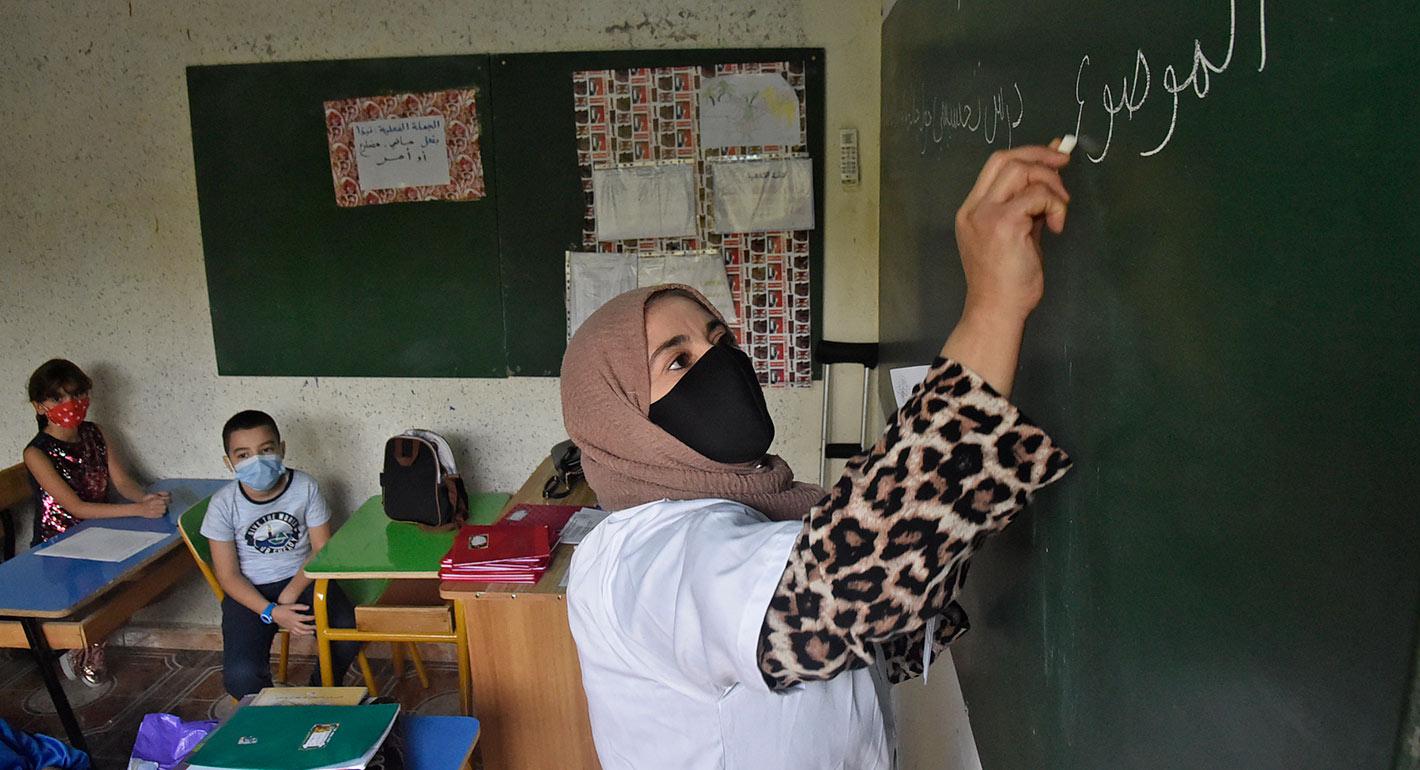{
"authors": [
"Abu Bakr Khaled Saad Allah"
],
"type": "commentary",
"blog": "Sada",
"centerAffiliationAll": "dc",
"centers": [
"Carnegie Endowment for International Peace"
],
"collections": [],
"englishNewsletterAll": "menaTransitions",
"nonEnglishNewsletterAll": "",
"primaryCenter": "Carnegie Endowment for International Peace",
"programAffiliation": "MEP",
"programs": [
"Middle East"
],
"projects": [],
"regions": [],
"topics": []
}
Source: Getty
The Politics of Language in Algerian Education
Recent government decisions to expand English language instruction in Algerian schools, though seemingly educational in nature, are only the latest developments in a longstanding national dispute.
In June 2022, Algerian President Abdelmadjid Tebboune made international headlines when he decreed that English would be taught in elementary schools. Tebboune went one step further this past May, announcing the launch of a new high school program in English language pedagogy to solve what he termed an “employment crisis.” And following the president’s announcement, the Secretary General of the Ministry of Higher Education instructed university directors to prepare for the adoption of English as the language of instruction for the coming academic year.
To understand the strategic importance of these decisions, it is necessary to go back in time to pre-independence Algeria. Before 1962, education was accessible only to a small number of Algerian elite and was mostly given in French, while a handful of independent schools provided instruction in Arabic to preserve the native tongue of the country. After independence, education in Algeria became fully bilingual, which created new national divisions: while some supported teaching in French, which they described as a “war trophy,” others argued for the supremacy of the Arabic language as the incubator of the national identity. This conflict has persisted to this day, driven by the politics and orientations of the country’s leaders.
In the mid-seventies, the country decided to move away from the existing French curricula and introduce what they called the “basic school" system, where primary and secondary education was conducted in Arabic. This was extended to higher education by the beginning of 1990, but supporters of French successfully pushed to ensure that science departments would not be affected by this wave of Arabization.
Meanwhile, a separate conflict over introducing English in primary education remained unresolved. While French was taught starting from the third year of elementary school, English was only taught as a third language beginning in middle school. French supporters refused to allow the introduction of English at the primary level, and the clash came to a head in the early nineties, when the Minister of Education, an advocate for Arabization, allowed primary school students to choose between French and English. The Algerian media had a field day with the huge debate that ensued, but a few years later the project was aborted, and English was removed from primary education.
This dispute reflects an ideological divergence between the two groups—supporters of French, on the one hand, and English on the other—and a fear of losing their respective political and social influence. If English language education gradually prevails, the Francophone current will weaken more broadly throughout Algerian society, especially given the tendency among youth to lean towards English over French. The shift towards English would also be advantageous to the supporters of Arabization, who have long alleged discrimination in employment, given the scarcity of opportunities in administrations and companies that operate solely in French.
Although the decision to shift to English in primary schools is the prerogative of the Ministry of Education, it is also clear that this issue is affected by the political, economic, and cultural relations between Algeria and France. Bilateral relations between the two countries tend to improve when Algeria continues to use French in schools, universities, and public administration, and tilts the other way when the balance is disturbed by the introduction of either English or Arabic.
In 2019, the Minister of Higher Education tried to draw public attention to the necessity of replacing French with English as the language of research and instruction in universities. Although he pointed out the importance of English as the international language of science, and the need to attract foreign students to the country, his attempts were resisted and he stepped down without achieving this goal.
Nonetheless, the question of introducing English at the primary level remained on the table and reemerged last June. Despite the hastiness of Tebboune's decision, the government appears adamant on implementing it this time. They are helped by the fact that parents of primary students, who still remember the failure of the nineties’ experiment, seem to cautiously welcome the decision. However, the tight timeline given for the implementation of the decision may jeopardize the success of this effort, allowing and French supporters to abort it as they did before.
What also remains to be determined in this war over language choice is the status of the Arabic language in university education, which neither students nor decision makers seem willing to consider properly.
In summary, considering history and the future of the country, the solution to this language dilemma lies in giving Arabic the importance it deserves as a national and official language and giving English greater importance at various levels of education—without compromising the French language, to which Algeria is historically linked.
Abu Bakr Khaled Saad Allah holds a doctorate in applied mathematics and is a professor of mathematics at the Ecole Normale Supérieure in Algeria. He is a researcher at the Laboratory of Partial Differential Equations of the Ministry of Higher Education.
About the Author
Abu Bakr Khaled Saad Allah
Carnegie does not take institutional positions on public policy issues; the views represented herein are those of the author(s) and do not necessarily reflect the views of Carnegie, its staff, or its trustees.
